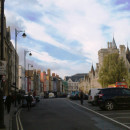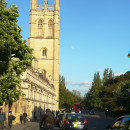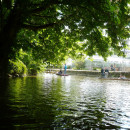Great Way to Travel through Europe Past Review
By jlin5 (Economics., Wellesley College) - abroad from 10/01/2012 to 06/12/2013 with
University of Oxford - Visiting Students
It was generally worthwhile, although what I really enjoyed was having the time to travel rather than the program itself. The two six-week long breaks and the limited class time commitments meant I could go a lot of places. I went on Mediterranean cruises (go with a lot of friends if you do--it's more fun and cheaper, and it only costs a little more than backpacking that way if you book early and not during peak cruise times), backpacked, day tripped. I had never been to Europe before, so it was a new experience, although I didn't feel much culture shock other than the degree of racism and ignorance that still exists on this continent. I don't think I would do the program again, though, because I regularly think that I should be in Australia instead--for the weather, the atmosphere, and academic-leisure balance in lifestyle.
Review Photos





Personal Information
| How much international exposure did you have prior to this program? | 6 months+ |
Review Your Program
|
* Overall educational experience
Academic rigor, intensity, resources, etc. |
I took a primary and secondary tutorial every trimester (the primary on economics, and the secondary generally relating to Chinese studies), meaning that I averaged an hour and a half a week in class time. For reference, I took: Public Economics, Politics of China, Economics of Developing Countries, International Relations of China, Economics of China, and Chinese Contemporary Literature. I loved my economics courses and tutors and had considerable freedom in choosing those tutorials, but the "Oriental studies" department at Mansfield is smaller, so it was more difficult to find classes that catered to my interests in sociology, feminism, and popular culture/media in China. Overall, it turned out extremely well, but sometimes I would only find out what course I was taking after the term had already started. I didn't think the grading standards were as tough as Wellesley's, and I felt that the library system was neither transparent nor developed for students. Since I didn't live close to some of the libraries I needed, I found it frustrating when I couldn't check out a book and had to read it there, especially when their hours are more restrictive than Wellesley's. The tutorial system is incredibly intense when you're still adjusting to the program, but it has a lot of merits in terms of convenience as to how and when you want to study, not letting you get away with any weaknesses in understanding that you have, etc.. I will say that I missed having classmates that I knew (most of my tutorials had only me as a student) and could talk to, just to bounce ideas off of and kid around. On the other hand, I had the opportunity to travel a little during term because I could have some days to myself, and I found courses that Wellesley didn't offer (in particular, an economics of China course from a more economics than historical perspective). |
|
* Host Country Program Administration
On-site administration of your program |
I thought they were generally clear in helping us out, and everyone is willing to answer questions, although it's still difficult to figure out who is responsible for what. They registered me with the Mansfield doctor after I submitted a form (so I had some form of health care by the time I arrived), have regular meetings with us (partially to see that we're okay, and partially to confirm to Immigration that we're there), and generally try to make us feel welcome. It could be organized better, but they do give you all the information you need by the time you need it, so I had no real problems. |
|
* Housing:
How satisfied were you with your living arrangements? |
I lived in Mansfield College accommodation, in Ablethorpe Building. Everyone gets a sizable single and a shared bathroom/kitchen, and although it's not structured very well for meeting other people or your neighbors, it's a nice place to live. Only drawback is that it's a fifteen minute walk from Mansfield College's campus and the city center, but it's also close to a sports center (free access to pulse gym as a Mansfield student), a great street full of cheap restaurants, and a number of supermarkets. We did have problems with people stealing food from the refrigerator, or not washing dishes (and getting kitchens closed as a result), but it's the same dorm experience as in other places. |
| * Food: |
Mansfield hall's food is pretty good and relatively cheap, although I got tired of it quickly and didn't want to make the 30-minute round trip walk to and from. Food is expensive, and for a time, I thought I would lose my sanity if I had to eat another sandwich. I had a lot of trouble trying to purchase fruit at affordable rates and basically resolved that situation by purchasing fruit at exorbitant ones. To their credit, afternoon tea, their biscuit selection, and paninis are amazing. Indian food here has been good, and I'm fond of Nando's. There wasn't a lot of good Mexican food (or Spanish food, unless you go into London) or East Asian food, and I found absolutely no good sushi. Benefits, of course, are that you don't have to typically worry about getting food poisoning, kebab vans are open late in case you're hungry at night (although almost all places in Oxford close early), and supermarkets sell a lot of ready-to-eat food that is convenient when you want to go on a picnic or are in a rush. |
|
* Social & Cultural Integration:
How integrated did you feel with the local culture? |
Not very. I mostly became friends with other visiting students, whether at Mansfield or through Wellesley friends at other colleges, but the level of integration varies from person to person. I personally found that third years don't have much time to make new friends primarily because they are preparing for their final exams throughout the year, second years tend to already have their friend groups, and freshers feel kind of young to me. I made some friends from helping host some students during a feminist debate tournament, met up with a British friend that I've known since seventh grade but haven't seen in some 7 or 8 years, but I generally didn't feel like I fit in. |
|
* Health Care:
How well were health issues addressed during the program? |
I had a dentist check-up because I had some sore gums, but it wasn't taken anywhere as seriously as it would be in the US (no cleaning except in a "problem area"). It was easy to book an appointment. I also went to the doctor once, and while it was a simple enough process to get the test that I needed, a number of websites made it incredibly confusing on who offered that test. There weren't any prevalent health issues, although as Mansfield Ball, they served some seafood that gave about half of the people who went food poisoning. |
| * Safety: |
I had someone roll down their window on a main street and ching chong at me. There is also a strange man who walks around Oxford trying to trip women with his cane and once bumped into my friend on purpose and called her a "fat cow." I am ni-hao'd on the street about once a week by random strangers. I would say that I generally feel safe, but I do carry a safety alarm with me, avoid side streets once it gets dark, and usually don't stay out late during breaks when a lot of students aren't around. Ablethorpe and the Renault House apartments are not in the nicer part of Oxford. I get a lot of passive aggressive talk for being Asian, but usually didn't feel that my physical safety was in much danger. |
| If you could do it all over again would you choose the same program? |
No
|
Finances
|
* Money: How easily were you able to live on a student's budget?
(1 = not very easy/$200+ on food & personal expenses/week, 2.5 = $100/week, 5 = very easily/minimal cost) |
I did end up making a regular trek to Tesco's for cheaper food, cooked some for myself or ate at really cheap places when I didn't have time to cook (like a sandwich for 3 pounds or under), and used a lot of coupons/loyalty cards. On a side note, I also participated in a number of psychology experiments to earn extra income. I would say that I was also partially stingy because I was saving up so I could travel during breaks (and also during term). A 5 and a half-day trip to Berlin, staying with friends studying abroad there, cost less than $300 for the airline ticket, transportation, food, souvenirs, etc., so for my budget, I was fine, but I tried hard to save money so I could make those trips. |
| Not including program expenses, about how much money did you spend on food and other expenses each week? | Probably around 125 dollars a week, but it depends on the week. |
| Do you have any general money-saving tips for future study abroad participants? | Fruit tends to be cheaper at the farmer's market on Wednesdays in Gloucester Green. Shop at Tesco, and get a Tesco loyalty card. Bring your own bags to earn points at Tesco and help the environment, and use the coupons that they send you. Once you get vouchers (from your points), you can exchange them for tokens. I got twenty pounds in tokens from a five pound voucher towards my Blenheim Palace admission that way, although don't go crazy over the program because that five pound voucher also meant I spent about 300 some pounds at Tesco (easier to do than you'd think). Tesco also started a price comparison program, so they may print a receipt for you to get that money back on your next purchase. Participate in some psychology experiments. Hours are flexible with them, and they pay pretty decently. You can usually make 10 pounds an hour. |
Language
| * Did your program have a foreign language component? | No |
Other Program Information
|
* Where did you live?
Select all that apply |
|
|
* Who did you live with?
Select all that apply |
|
|
* Who did you take classes with?
Select all that apply |
|
| About how many local friends did you make that you will likely keep in touch with? |
A Look Back
| * What did you like most about the program? |
|
| * What could be improved? |
|
| * What do you know now that you wish you knew before going on this program? | If it's sunny, go out. If it's raining and you have some time to kill, go out. If it's raining and you're moderately busy, maybe you should still go out. I wouldn't try to travel outside the UK during your first term, but go into London, Brighton, the Cotswolds, Cambridge, Blenheim Palace, or Bath. Plan your trips during break early, but definitely be careful of who you bring with you. Don't get caught up in trying to see everything--take time out to enjoy the food (even if it's expensive, it's a new experience, and save on things that aren't...like don't buy water in restaurants, or pay for a museum that may be great, but is on something like natural history unless you're really into natural history), watch a free comedy show, hang out in a park. Travel can be exhausting and frustrating if you try too hard to mold it into the perfect adventure. Plan some things early, but leave a lot to the imagination. Plan to have churros and paella and go to La Sagrada Familia and the beach, but let the rest of the day be open. On a more practical note, start looking for internships early. |
Reasons For Studying Abroad
| To help future students find programs attended by like-minded individuals, please choose the profile that most closely represents you. |
The Avid AdventurerThe wardrobe you packed was better suited for a semester of camping than club hopping. Outdoorsy, you might forgo a crazy night out for an early all-day adventure. You'd rather take in the rich culture of an old town than the metropolis of a modern city, but for you getting off the grid is ideal. |








